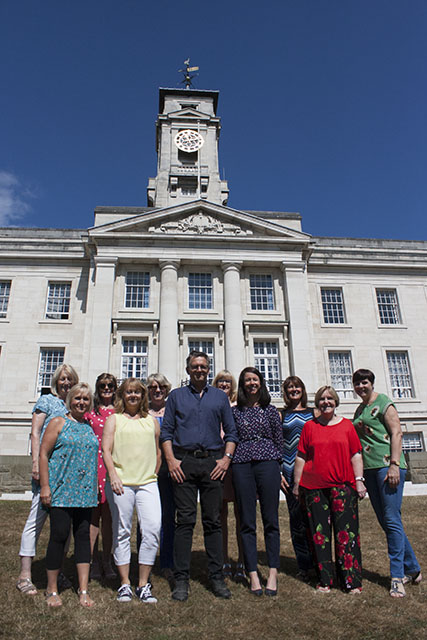
September 24, 2018, by Emma Rayner
Researchers help BBC Trust Me test the natural high from ‘feel good’ activities
Can activities like singing, dancing and cycling in a group give us the same natural high that some people feel after a good long run? That’s the question our researchers at the University’s Division of Medical Sciences and Graduate Entry Medicine over at the Royal Derby Hospital have been tackling with TV doctor Michael Mosley and his Trust Me I’m a Doctor film crew.
Dr Saoirse O’Sullivan has become Michael’s ‘go-to’ expert in the ‘mood-governing’ endocannabinoid system and its role in our health and wellbeing. Last January they scientifically tested and proved the ‘runner’s high’ theory in a popular BBC One documentary, The Truth About Getting Fit.
Over the summer, Michael and his crew were back in Derby and on campus in Nottingham to take the research a step further and look at alternatives to running, to find out whether they could offer the same mood-lifting effects.
Michael said: “There’s plenty of anecdotal evidence that taking part in a group activity such as singing in a choir, joining a cycling club or a dance class can lift the spirits, combat depression and even lower stress and blood pressure levels. But we were curious to test the theory scientifically by looking for chemical changes in the blood. Saoirse and her team at Nottingham are experts in this field and are brilliant at understanding the needs of the Trust Me team whose job is to translate quite a difficult bit of science into a compelling and entertaining piece of television. The results were very interesting and all will be revealed in the programme on Wednesday night!”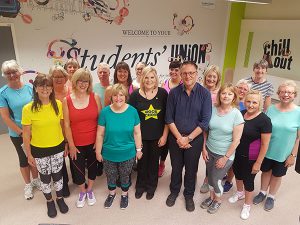
The Trust Me team recruited 9 volunteers from the Derbyshire and Nottinghamshire Rock Choir who were in good physical health. Over four separate days in June, the group took part in four different activities – cycling in a group, singing in a choir, a dance class and, as a contrasting ‘boring’ activity (the control activity) they sat and read a dishwasher or boiler instruction manual.
The participants were asked to skip breakfast and not to drink coffee or alcohol for the 12 hours before each activity. Heart rate, blood pressure and blood samples were taken before and after each activity as well as questionnaires about mood, wellbeing and appetite. The timings of the test days were always the same and took place in the same room.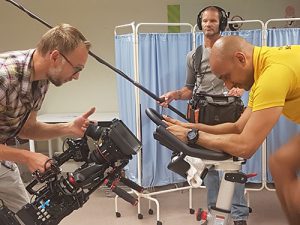
Saoirse said: “This was a really fun project to be involved with. The ladies from Rock Choir were brilliant to work with and we got some excellent first-of-their-kind results that have a real impact on everyday lives. Our results help to prove scientifically why some activities can improve our mood and mental health, and will hopefully encourage people to get out there and do the things they love. We have submitted a full academic research paper to a journal on our study which is currently being peer-reviewed.”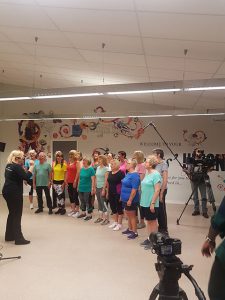
One of the study volunteers, Elaine Tolley, from Mickleover Rock Choir said: “I thoroughly enjoyed taking part in the trial and the BBC filming and found it all very exciting and thought provoking. I had never considered that singing in a choir or doing exercise could have a seriously uplifting effect on a person. Thank you for the amazing experience.”
Dawn Wood from Derby Rock Choir added:”I was thrilled to be involved in what turned out to be a fabulous experience. Working alongside a dedicated professional team striving to improve our well-being was an honour.”
Going the extra mile to help Saoirse and the BBC set up the experiment were the staff at the University’s David Ross Sports Village. Health and Fitness Manager Tom Sherratt said: “The runner’s high is well known but less so with other activities, so when we were approached by the BBC to support this study and the filming of this programme we were of course more than happy to help. We agreed to provide 12 of our 25 indoor cycles, which are used as part of our popular indoor cycling group exercise programme at the David Ross Sports Village, plus one of our instructors to deliver a cycling class to the study participants. We are now looking forward to watching the programme on 26th September and finding out if you have to run to get a ‘runner’s high’.”
The BBC Trust Me I’m a Doctor episode is broadcast at 8pm on Wednesday 26thSeptember on BBC Two.
No comments yet, fill out a comment to be the first

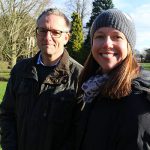
Leave a Reply